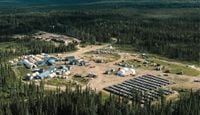THUNDER BAY — The Ontario provincial government's recent initiative to declare areas like the Ring of Fire as "regions of strategic importance" and expedite mining approvals has sparked significant backlash from local Indigenous leaders and politicians. On April 16, 2025, Sol Mamakwa, the NDP MPP for Kiiwetinoong, voiced strong opposition, asserting that First Nations' lands are not for sale. His comments followed the Speech from the Throne delivered by Premier Doug Ford, which outlined a plan to streamline mining operations for critical minerals.
During the throne speech on April 15, the government committed to simplifying permitting and approvals for mining projects, aiming to bolster Ontario's economy amidst perceived threats from U.S. President Donald Trump. Ford emphasized the urgency of mining operations, stating, "President Trump wants to destroy our economy, take jobs away from Ontarians and Canadians, and we have to get up and fight like we've never fought before." This sentiment reflects a broader strategy to enhance Ontario's economic security through the extraction of critical minerals.
Mamakwa challenged the government's approach, highlighting the importance of free, prior informed consent from First Nations regarding mining regulations. He stated, "You cannot just fast-track mining or the regulations and the work that needs to happen, and not involve the processes of the free, prior informed consent." He expressed skepticism about the government's commitment to consulting Indigenous communities, noting that some ministers indicated the new legislation would not significantly impact the duty to consult.
The Matawa Chiefs Council, representing First Nations surrounding the Ring of Fire, echoed Mamakwa's concerns. They issued a statement demanding formal discussions with the government before any legislation is enacted. The council insisted that designating regions of strategic importance should only occur through meaningful engagement, mutual respect, and negotiation of agreements that address the priorities of the Matawa First Nation communities alongside Ontario's interests.
Ford's administration has characterized the Ring of Fire, a vast area in northern Ontario rich in minerals, as crucial to Canada's economic future. The government asserts that the region contains valuable deposits of chromite, copper, cobalt, nickel, and platinum. In a bid to facilitate development, the province intends to funnel all necessary paperwork through the mining ministry, guaranteeing a response within 24 months to expedite the approval process by up to 50 percent.
However, the Ring of Fire project has faced numerous challenges over the past 15 years, including infrastructure limitations, Indigenous opposition, and environmental concerns. The current timeline for development is conservatively estimated to extend into the early 2030s. Despite the Ontario government's promises to cut red tape, many stakeholders express doubts about the feasibility of rapid development.
In a press conference on April 17, Minister of Energy and Mines Stephen Lecce reiterated the government's commitment to streamline resource development. He acknowledged that mining companies often navigate a complex web of provincial ministries to secure approvals. "Fifteen years of missed opportunity, 15 years of jumping through hoops... drives away investment," Ford lamented, emphasizing the need for immediate action.
Critics, including Ontario Regional Chief Abram Benedict, have cautioned that the new mining legislation could infringe upon the rights of First Nations. Benedict stated, "True economic reconciliation cannot happen through exclusion," urging the province to collaborate with Indigenous communities as equal partners from the outset.
Three First Nations—Marten Falls, Webequie, and Aroland—have signed agreements with the province to assist in developing the Ring of Fire. Marten Falls and Webequie are also leading environmental assessments for proposed roads connecting the mine to the provincial highway system. Mamakwa, however, criticized the government's current consultation practices as insufficient, calling them "the bare minimum."
Kristan Straub, CEO of Wyloo Canada, which is developing the Eagle's Nest mine site in the Ring of Fire, expressed optimism about the new legislation. He noted that the changes would simplify the approval process, potentially accelerating development. However, he acknowledged the importance of maintaining environmental oversight and the duty to consult Indigenous Peoples.
As the provincial government moves forward with its plans, concerns about Indigenous rights and environmental impacts continue to loom large. The Matawa Chiefs Council has warned that unilateral legislative actions could jeopardize ongoing negotiations with the government and the mining industry.
Ford's government has also hinted at utilizing the new legislation to designate strategic zones for other major projects, such as a proposed transit and traffic tunnel under Highway 401. This ambitious initiative, which some experts estimate could cost between $60 billion and $120 billion, has raised eyebrows regarding its practicality and potential impact on traffic congestion in Toronto.
In light of these developments, the Ontario government faces mounting pressure to ensure that its mining policies are not only economically beneficial but also respectful of Indigenous rights and environmental sustainability. As the discussions continue, the path forward for the Ring of Fire and other resource development projects remains uncertain.








